|
|
|
Sort Order |
|
|
|
Items / Page
|
|
|
|
|
|
|
| Srl | Item |
| 1 |
ID:
172419
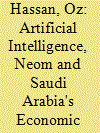

|
|
|
|
|
| Summary/Abstract |
Saudi Arabia is diversifying its economy by becoming a global technological hub. Driven by its ‘Vision 2030' initiative, it has embarked on the most ambitious and far‐reaching transformation plan in the Kingdom's history. At the core of this transformation are the investment and development of artificial intelligence (AI) and its integration into a new mega‐city, Neom. Currently under construction, Neom is seeking to integrate robotics and AI seamlessly into every aspect of citizens' lives in a bid to generate revenues from key economic sectors for the future. This transition from an economy based on hydrocarbons to AI is, however, more than economic. It is a bid to secure the survival of the House of Saud and meet the growing challenges of constructing a state around oil. Nevertheless, what happens in Neom may provide insights into how AI will impact the world beyond a cross‐roads built on sand.
|
|
|
|
|
|
|
|
|
|
|
|
|
|
|
|
| 2 |
ID:
101011
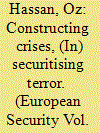

|
|
|
|
|
| Publication |
2010.
|
| Summary/Abstract |
The European Union's (EU) counter-terrorism strategy has been particularly dynamic, developing as a result of 'crises' and subsequent post-crisis narrations. The events of 11 September 2001, and the Madrid and London bombings have proved to provide moments of punctuation from which policy evolution and institutionalisation has followed. As a result of such crises, the EU has increasingly regarded terrorism as a direct challenge to the Union's role as a security actor and sought to institutionalise a diverse range of security governance technologies across its multiple pillars. Such an approach is noticeable for its qualitative difference compared to EU strategy pursued throughout the end of the twentieth century, and demonstrates an increased willingness for the EU to assert its role in the world. Yet, what is highly noticeable from the EU strategy and the proliferation of security governance technologies is the manner in which the EU has securitised 'terrorism' in the pursuit of internal, external and normative objectives. As a consequence, the EU has inflated the threat posed by terrorism, and increasingly attempted to 'Europeanise' its response. Evident in such a strategy however, is the manner in which counter-terrorism practices can generate greater insecurity inside and outside of the Union.
|
|
|
|
|
|
|
|
|
|
|
|
|
|
|
|
| 3 |
ID:
173945
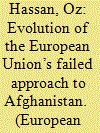

|
|
|
|
|
| Summary/Abstract |
This article provides a genealogical account of European actorness in Afghanistan. It argues that European agreement towards facilitating modernisation and development in Afghanistan was initiated with aid and trade, evolving into humanitarianism in the 1990s, and reconstruction and democratisation in the 2000s. The European Union has had a positive impact on Afghanistan, focusing on humanitarianism, but its multilateral and programme level approach to reconstruction and democratisation has failed to meet the EU’s stated objectives. By promoting the flawed “Bonn Model”, the EU is proportionally culpable for failed international attempts to reconstruct Afghanistan; even though the United States has been the primary international actor. Drawing a series of broader lessons, such as tensions between Atlantic solidarity and European integration, and the limitations of the European crisis management, the article demonstrates how European policy has been shaped by crises inside Afghanistan and the larger geopolitical crises these have generated. These have contemporary importance as history suggests that as the US withdraws its commitment to Afghanistan, the EU will have a very significant role in attempting to fill a humanitarian vacuum.
|
|
|
|
|
|
|
|
|
|
|
|
|
|
|
|
| 4 |
ID:
121576
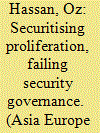

|
|
|
|
|
| Publication |
2013.
|
| Summary/Abstract |
In 2003, the European Union declared the threat of weapons of mass destruction 'potentially the greatest threat to our security' and increasingly called for the issue of nuclear proliferation to be managed within its preferred multilateral security governance frameworks. In spite of this, and the increased securitisation of proliferation, the EU has fundamentally continued its historical record of failing to engage with India and Pakistan's nuclear rivalry, and has not been able to move significantly beyond a relationship with South Asia based on trade and aid. This is deeply problematic given the regional instability posed by the Indo-Pakistani enduring rivalry, and the fact that Pakistan is not only an unstable nuclear weapons state, but has been known to harbour international terrorists and nuclear proliferators. Given these conditions, as the EU acknowledges, the stakes of failing to engage could not be higher. A deeper analysis of EU engagement, however, demonstrates that EU security governance is limited, ineffectual, inconsistent and largely perceived as neo-colonial in what is the world's most likely nuclear flashpoint. If the EU is to be considered a global actor in security governance, a key objective of the Treaty of Lisbon, then this needs to be redressed.
|
|
|
|
|
|
|
|
|
|
|
|
|
|
|
|
| 5 |
ID:
114941
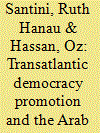

|
|
|
|
|
| Publication |
2012.
|
| Summary/Abstract |
The Arab Awakening can be seen as a symptom of failure of US and EU democracy promotion policies in the region. By identifying democracy with 'liberal democracy' - a discursively powerful political move - the contingent character of democracy has been lost. The US and the EU, the main promoters of a neoliberal understanding of democracy, have sided with the wrong side of history. And because they have failed to deeply revise the philosophical underpinnings of their policies, even after 2011, they risk another, even bigger, policy failure.
|
|
|
|
|
|
|
|
|
|
|
|
|
|
|
|
| 6 |
ID:
179801
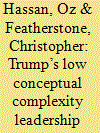

|
|
|
|
|
| Summary/Abstract |
This article argues that the Trump administration was not guided by an unpredictability doctrine, but was unpredictable because of the President's low conceptual complexity leadership style. This conclusion is derived by using grounded theory and utilising computer-assisted qualitative data analysis software. We demonstrate that the notion of an unpredictability doctrine was introduced exclusively within the 2015–2016 Republican primary season to avoid accountability; especially in the realm of foreign policy. The notion of being unpredictable served an important political function, but was not part of a doctrine nor conviction in any meaningful sense. As a result, there was no commitment to an unpredictability doctrine throughout President Trump's time in office, except as a persistent myth broadcast by the various media outlets. We show that the notion of unpredictability and low complexity leadership was most evident with regards to the Trump administration’s confrontation with the Islamic State. Whereby Trump’s early evasion of accountability, and lack of a plan, was justified with appeals of needing to act secretly. Our analysis shows that Trump’s unpredictability was not intentional, but was rather a by-product of low conceptual complexity informing the formulation of policy.
|
|
|
|
|
|
|
|
|
|
|
|
|
|
|
|
|
|
|
|
|